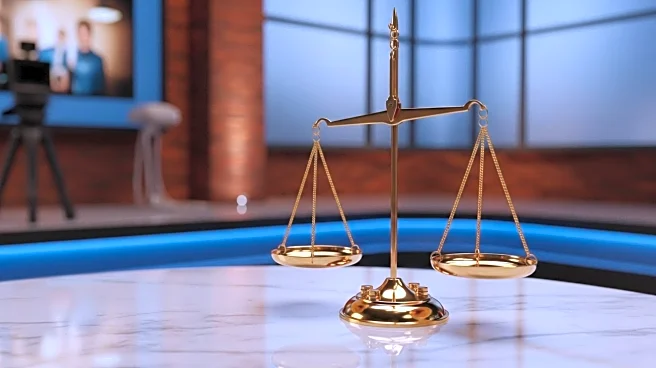What is the story about?
What's Happening?
Roseanne Barr has publicly criticized ABC for what she perceives as a double standard in handling controversies involving television personalities. Barr's comments come in the wake of Jimmy Kimmel's return to ABC after a brief suspension due to controversial remarks. Barr, who faced significant professional repercussions following a 2018 tweet deemed racist, argues that Kimmel's reinstatement highlights a disparity in how similar situations are managed. Barr's show was canceled after her tweet about Valerie Jarrett, an Obama-era aide, which she later apologized for. In contrast, Kimmel returned to his role shortly after his suspension, despite past controversies involving blackface performances. Barr's grievances extend to other TV personalities like Whoopi Goldberg and Sarah Silverman, who have faced backlash for similar issues.
Why It's Important?
Roseanne Barr's criticism of ABC underscores ongoing debates about 'cancel culture' and the perceived inconsistencies in how media companies handle controversial figures. Barr's situation highlights the complexities of public accountability and the varying consequences faced by celebrities for their actions. The discussion raises questions about fairness and the criteria used by networks to determine the severity of repercussions. This issue is significant for the entertainment industry, as it reflects broader societal debates about free speech, forgiveness, and the impact of social media on public figures. The contrasting treatment of Barr and Kimmel may influence public perceptions of media bias and the role of networks in shaping cultural narratives.
What's Next?
The controversy surrounding Roseanne Barr and Jimmy Kimmel may lead to further discussions about the role of media companies in regulating content and managing public figures. Stakeholders in the entertainment industry, including networks, producers, and talent agencies, may reassess their policies on handling controversies and the criteria for suspensions or cancellations. Public reactions and media coverage could influence future decisions by networks regarding similar situations. Additionally, Barr's comments may prompt debates about the effectiveness and fairness of 'cancel culture,' potentially leading to changes in how public accountability is approached in the entertainment sector.
Beyond the Headlines
The situation involving Roseanne Barr and Jimmy Kimmel highlights deeper issues related to media ethics and the cultural impact of 'cancel culture.' It raises questions about the balance between accountability and forgiveness, and the role of media companies in shaping public discourse. The contrasting treatment of Barr and Kimmel may reflect broader societal tensions regarding race, gender, and power dynamics in the entertainment industry. This controversy could contribute to ongoing discussions about the ethical responsibilities of media companies and the cultural implications of their decisions.















